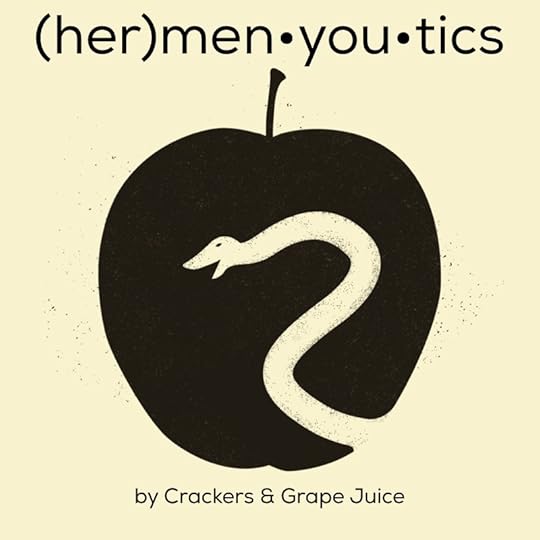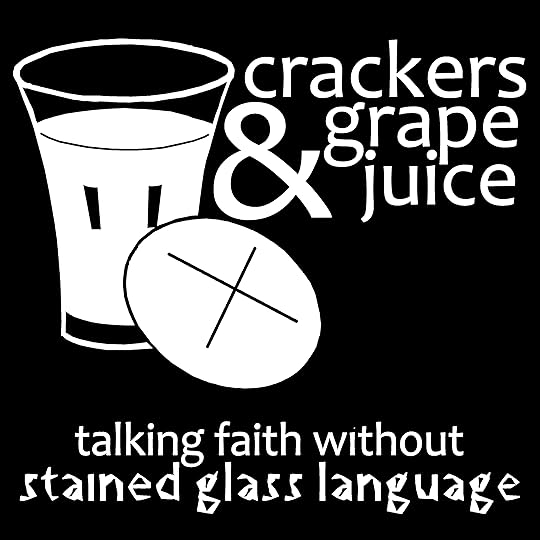Jason Micheli's Blog, page 122
May 3, 2018
Her(Men)*You*Tics: Liturgy

I spent last week at the Mockingbird Conference in NYC. Podcast partner Johanna Hartelius joined me, and we enjoyed the happy coincidence of hearing from many listeners to the podcast, particularly fans of Her(Men)*You*Tics. Apparently people like the podcast where “that woman gives Jason @#$% about the faith.”
Fair enough.
We’re working our way through the alphabet one stained-glass word at a time. Next up, LITURGY. Liturgy isn’t only a word mainline clergy use to avoid talking about Jesus; it’s our word for worship, meaning: “the work of the People.”
While we’re at it, let’s use this opportunity to congratulate Johanna on her new position at her alma mater, the University of Texas, teaching rhetoric.
Help us reach more people:
Give us 4 Stars and a good review there in the iTunes store.
It’ll make it more likely more strangers and pilgrims will happen upon our meager podcast. ‘Like’ our Facebook Page too. You can find it here.
Help support the show! This ain’t free or easy but it’s cheap to pitch in.
Click here to become a patron of the podcasts
Follow @cmsvoteup

May 1, 2018
You Might be the Antichrist If…
The Eastertide lections from 1 John got me thinking about antichrist. These letters of John, after all, are the (only) place we found that scary-sounding word in scripture:
“By this you know the Spirit of God: every spirit that confesses that Jesus Christ has come in the flesh is from God, and every spirit that does not confess that Jesus has come in the flesh is not from God…this is the spirit of the antichrist.” – 1 John 4
If we take St. John seriously, then it’s easier to be an antichrist than Kirk Cameron has led you to believe.
Identifying the antichrist doesn’t require reading the signs of the times or breaking any biblical codes. It doesn’t even require you to ever turn over to the Book of Revelation. It just requires a little self-reflection. Because, take it from St John, you might be an antichrist.
[image error]
You might be an antichrist if…
If you think Christianity is about ‘spiritual’ things- or timeless ‘truths,’ then you might be antichrist.
If you think that salvation is what happens to us after we die, if you believe that our soul leave our bodies and go off to heaven when we die, if you think the goal of Christianity is to go to heaven when you die, then you might be an antichrist.
If you have ever sat next to a bedside or a graveside and said something like: ‘Her body, his body, that’s not really him, that’s not really her. It’s just a shell’ then you might be an antichrist.
If you ever used that poem for a funeral, the one that goes: Do not stand at my grave and weep/I am not there. I do not sleep/ I am a thousand winds that blow/I am the diamond glints on the snow/Do not stand at my grave and cry/ I am not there/ I did not die.
If you ever used that poem at a funeral, then chances are your undertaker was an antichrist.
If you believe that Christianity teaches the evacuation from creation (ie, the rapture) instead of the redemption of all creation (New Creation) then I hate to be the one to break it to you but you might be an antichrist.
If you think God does not care about the Earth or that the physical, material things in your life are not good gifts from God thus means of grace to God and from God then your belief is what St. John calls antichrist.
If you know someone who insists that they ‘can worship God better in nature’ (ie, play golf) then the next time that someone says that just calmly but convincingly call them the antichrist.
Because you could never find something as counter-intuitive as Jesus in nature and God, the fullness of God, didn’t take spirit. It took flesh.
And God dwelt not in the mountains or the trees but in Jesus. So don’t be shy call them as you see them, call that someone an antichrist.
Don’t be shy about calling them an antichrist because you might be one too.
If you think religious people are all basically the same because ‘we all believe in the same God after all’ you might be an antichrist. Because that generalized God took very particular flesh and became a very specific first century Jewish carpenter from Nazareth who taught some very peculiar things.
You see, Kirk Cameron with his vacant Growing Pains cuteness has us all fooled.
It’s not that hard to be an antichrist.
You are if you’re uncomfortable with the idea that God ever burped, farted, or hit puberty. I know it might sound silly but you don’t really believe that God became fully human if you don’t believe he was at least as human as you or me.
And that way of thinking- John calls that antichrist. The more you pick at it, the more you pull on the thread, the more you see that St John is right. The spirit of the antichrist is everywhere.
If you think the letter of scripture or your political platform deputizes you for ugly, un- Jesusy, Pharsaic behavior towards another (‘Love the sinner, hate the sin’) then you are an antichrist. You’ve removed the mode of Jesus’ earthly, fleshly life from your message about Jesus.
And, look, pot- meet kettle. I’m guilty too.
Because honestly, it’ll come as no surprise, I spend more time polishing my theological ideas than I do in prayer. I spend more time preaching the Gospel than I do practicing it. I’m amazed that God is gracious to a sinner like me, but I’m annoyed whenever God does the same for a sinner worse than me.
And with Christ, in Christ’s life, it all worked the other way round. Which means my way goes against the grain. Which makes me- you guessed it- an antichrist.
[image error]
And that surprises us.
It surprises us because Kirk Cameron, with his vapid Huey Lewis-like expression, has convinced us all that the antichrist is an auspicious figure marked out by the number 666, a fantastical, future political leader who will lure people’s loyalty away from God before ushering in a time of terrible tribulation which itself will usher in the Rapture, the Last Judgment and the ultimate- very unJesusy- destruction of God’s creation by God himself.
He seemed so innocent on Growing Pains that we’ve let Kirk Cameron convince us that the antichrist is the one who will wreak all that scary stuff near the end of your bibles.
But what the street corner evangelists and the cable TV preachers don’t tell you, what the whole end-times, Left Behind industry doesn’t tell you:
The word ‘antichrist’ does not occur anywhere- anywhere– in the Book of Revelation.
Not once.
The word ‘antichrist’ (which is the complicated Greek word αντί Χριστός, ‘anti-Christos’) occurs nowhere in scripture, nowhere in the Bible except here in St. John’s first 2 letters.
The word ‘antichrist’ occurs just 5 times in bible in only 4 verses in no more than these 2 letters from John.
And in these letters from John the word ‘antichrist’ is not a title, it’s not a proper name, it’s not a specific individual person who portends tribulation. In John the word ‘antichrist’ refers to those people, any people, who deny that God had a real blood and bones body. That God took flesh in Jesus, that God became fully human.
Who John had in mind specifically were the Gnostics, an ancient heresy that still pops up all over the place today in both pews and popular culture. The gnostics believed that the physical, material world was corruptible and thus inherently imperfect. They believed that what was eternal was the spiritual.
And therefore the gnostics believed that ‘salvation’ was about your spiritual soul escaping your physical body, escaping this physical world for the spiritual one, for heaven.
Not surprisingly, then, the gnostics took a dim view towards the God of the Old Testament, the God who not only made this physical world and our embodied selves but declared it all ‘very good.’ Even less surprising, the gnostics refused to believe that ‘God’ would ever leave the perfect, spiritual world and take up residence, take flesh in Jesus. And so the gnostics were left two alternatives, the two alternatives that are still with us everywhere.
You could believe that Jesus was human, as human as you or me, but just human, just another teacher, a teacher you can follow as far as you want but dismiss whenever you want.
Or, if you were a gnostic, you could believe that Jesus wasn’t just another teacher but neither was he just another human. Because he wasn’t fully human like you or me because God would never debase himself to become like you or me.
John pulls no punches. He warns us away. He calls all that ‘antichrist.’
And it is.
To deny that God became fully human is antichrist because it leads us to stop seeing the world as Jesus saw it, to stop living in the world as Jesus lived in it, to stop heeding the words that the Word made flesh spoke into it. To deny that God became fully human is antichrist because it leads us in no time to live our lives against the grain of the way he lived his.
I know on any given day I’m in danger. The bad news is that it’s actually pretty easy to be an antichrist. But the good news?
The good news is that the remedies for being an antichrist are many and they’re just as easy.
For example:
Pour a glass of good wine, roast a chicken, hold a baby or have sex. Because the sacred became physical in Jesus Christ and therefore all physical things are sacred.
The remedies for being an antichrist are easy. Here’s another:
Find a sinner- trust me, they’re not hard to find. Find a sinner, preferably someone who’s wronged you, and say to them: ‘I do not condemn you.’
‘I forgive you you know not what you do.’
‘Even though you curse, I will bless you.’
And when they ask you why you’re doing this or who told you to do this, just say: ‘God himself told me…in the flesh.’
Follow @cmsvoteup

April 28, 2018
Annual Conference Pub Theology with Kendall Soulen
 Crackers and Grape Juice continue our tradition of kicking off the Virginia UMC’s Annual Conference with a Live Podcast. Dr. Kendall Soulen of Candler School of Theology will be our special guest along with Dr. Johanna Hartelius of the University of Texas and host of our sister-podcast, Hermeneutics.
Crackers and Grape Juice continue our tradition of kicking off the Virginia UMC’s Annual Conference with a Live Podcast. Dr. Kendall Soulen of Candler School of Theology will be our special guest along with Dr. Johanna Hartelius of the University of Texas and host of our sister-podcast, Hermeneutics.
Details:
Thursday, June 14 from 6:00-9:00
Bull Island Brewing Company
You can find out more here
Follow @cmsvoteup

April 27, 2018
Episode #149 – Tony Jones: Reverend Hunter
 Tony Jones is a practical theologian with degrees from Dartmouth and Princeton. He’s an editor with Fortress Press (meaning, he’s my Crabtree), and he’s an avid hunter.
Tony Jones is a practical theologian with degrees from Dartmouth and Princeton. He’s an editor with Fortress Press (meaning, he’s my Crabtree), and he’s an avid hunter.
In a culture where guns are such a fraught and divisive issue, Tony brings his life experience, passion, and theological lens to the subject. Check out his hunting blog here.
Help us reach more people:
Give us 4 Stars and a good review there in the iTunes store.
It’ll make it more likely more strangers and pilgrims will happen upon our meager podcast. ‘Like’ our Facebook Page too. You can find it here.
Help support the show! This ain’t free or easy but it’s cheap to pitch in.
Click here to become a patron of the podcasts
Follow @cmsvoteup

April 26, 2018
(Her)Men*You*tics: Laughter
 What was supposed to be a conversation about Luke, turned into a conversation about laughter. We cover divine humor, a few potty jokes, and even talk about not-so-funny Christian comedians.
What was supposed to be a conversation about Luke, turned into a conversation about laughter. We cover divine humor, a few potty jokes, and even talk about not-so-funny Christian comedians.Help us reach more people:
Give us 4 Stars and a good review there in the iTunes store.
It’ll make it more likely more strangers and pilgrims will happen upon our meager podcast. ‘Like’ our Facebook Page too. You can find it here.
Help support the show! This ain’t free or easy but it’s cheap to pitch in.
Click here to become a patron of the podcasts
Follow @cmsvoteup

April 25, 2018
Mockingbird Conference NYC: Grace in Divided Times ~ Dialogue with Fleming Rutledge
 My friend David Zahl and the folks at Mockingbird Ministries have been gracious enough to invite me to be a part of their NYC conference later this week where I will do a dialogue with Fleming Rutledge. As readers of the blog and listeners to the podcast already know, Fleming Rutledge is both my preaching muse and my back-up wife.
My friend David Zahl and the folks at Mockingbird Ministries have been gracious enough to invite me to be a part of their NYC conference later this week where I will do a dialogue with Fleming Rutledge. As readers of the blog and listeners to the podcast already know, Fleming Rutledge is both my preaching muse and my back-up wife.
Taking the theme of the conference as my cue, I’ve chosen the following as springboard quotes off of which I’ll dialogue with Fleming. Thought I’d share them here as they’re golden.
Here they are:
“Religion does not define all human beings on the same level of need before God. Religion may see everyone on the level of spiritual potential, yes; but this is precisely what the gospel does not, because the gospel is not about human potential.”
“For all their various biblical resonances, there is something missing in the social justice gospel and its close cousin, liberation theology…they’re not inclusive enough.”
“The destructive separations and divisions among us…demand an apocalyptic interpretation of the Bible…for it, with its stress on the common plight of all humankind, is the one thing that unites scripture and binds us together.”
“The radicality of the statement ‘circumcision is nothing’ is almost unthinkable…the end of the Law is as close as anything to the revolutionary leveling of all human social organizations.”
“We must not let the idea of inclusiveness be wrested away from us. The gospel of the justification of the ungodly is more inclusive than anyone who does not know scripture could imagine.”
“Christian social action arises out of the radical breaking down of distinctions, not the introduction of new distinctions. This radical breakdown is expressed most succinctly in Paul’s crucial words: ‘Christ died for the ungodly.’”
“God loves everybody…the Golden Rule… no one who cares about God’s justice can be satisfied with those. Nothing will do but this Word: Christ died for the ungodly.”
Follow @cmsvoteup

April 24, 2018
Getting in the Way of Jesus
Musing on the coming lectionary text from Acts 8.26-40:
St. Luke’s story of the Ethiopian Eunuch is poignant because of what Luke doesn’t tell you. What Luke leaves unsaid.
For example-
Luke tells you that this “man had gone to Jerusalem to worship but was now on his way home.”
What Luke doesn’t tell you is that the Holiness Codes in the Book of Deuteronomy consider eunuchs to be sexually deformed. And thus ritually impure. And thus barred from the Temple. And thus barred from the worship life of Israel.
What Luke doesn’t tell you- and it’s kind of PG13 and I only mention it because it’s actually relevant- eunuchs in the Ethiopian Court were’t just castrated. They were dismembered too.
And so it’s not just a case of ritual impurity. He could never be circumcised.
And thus he could never follow the Law.
And so he could never become Jewish. And so he could never be welcomed. Or included among the People of God. And so what Luke leaves unsaid is that this man, the unlikeliest of seekers, has come all the way to Jerusalem, from a great distance, of his own accord, on his own dime-
Because he’s curious, because he’s hungry, because he wants to connect to God, because he has questions he wants answered, maybe because he can’t have a family of his own and he wants a community where he can belong.
What Luke leaves unsaid is that this man has taken the risk of being a newcomer, being a stranger, being an outsider- only to be turned away by a community that valued its traditions and its customs more than they valued him.
Luke leaves it unsaid but that’s why he’s on his way home.
Luke leaves the important parts unsaid.
For example-
Luke tells you it’s the Holy Spirit’s idea for Philip to be on that road to Gaza.
What Luke doesn’t tell you, what he leaves unsaid, is that as soon as Philip see that Ethiopian Eunuch, Philip would’ve had all the same reactions to him as the priests in the Temple did back in Jerusalem. Luke tells you that the Spirit commands Philip to approach the Ethiopian’s chariot.
What Luke leaves unsaid is that before Philip takes a single step towards that chariot he has to choose.
What’s more important?
The customs and traditions and categories he’s grown up with and always assumed?
Or the opportunity to help someone understand and experience the grace of God?
Luke leaves unsaid that before Philip gets up into that chariot, Philip has to decide. Is changing another’s life in Jesus Christ worth him having to change his?
And you can guess Philip’s answer because when the stranger asks Philip: ‘What’s stopping me from being baptized?’ Philip leaves unsaid every possible objection. Because none of those was as important as seeing this man rejoice in the grace of Jesus of Christ.
No amount of “obedience to scripture” then trumps seeing someone rejoice in Christ’s grace.
[image error]
According to the Pew Research Foundation, if you gathered together all the non-religious people in the US they would comprise the 11th largest nation in the world. According to that same research, 80% of Americans self-identify as Christian. But less than 1/4 of those Americans participate in a local church.
In other words- as the cliche goes: They like Jesus, just not the church.
In other words- They want to experience God; they just don’t think that’s going to happen for them Church.
Why is that?
I mean- sure, you could say they’re just not interested in the church. But I wonder how much of that is just us blaming the victim? I wonder if those statistics are the way they are because the grace and openness and welcome that people find in Christ is harder to be found in Christ’s Church?
The truth is-
Every church struggles with ‘here’s our version of Christianity and if you can find your spot in it, if you can adapt to our way of doing church, if you can accommodate us…we’d love to have you.‘
The first church struggled with this right out of the gate.
It starts with Philip here in Acts 8.
The first church struggled with which version of Christianity would be theirs, who they’d include and who they’d exclude, which ways of doing church would be the ways they would always do them.
And they eventually brought those struggles to a church-wide meeting in Acts 15.
And it was at that meeting that James, the brother of Jesus, made the decision for the first church, about what kind of church they would be. And what James said to the first church couldn’t be more important to today’s church.
James said:
‘We should not make it difficult for people to come to faith in Jesus Christ.’
Not even by abiding the sexual mores given to us in scripture.
I’ll let you connect the contemporary dots on that one.
The first church was able to move beyond Jerusalem and beyond the first century because they decided early on that they were going to be the kind of community that valued people more than personal preferences. They were going to be the kind of community that would remove-rethink-adapt anything they were doing that got in the way of people turning to God.
How they did church was not going to be as important to them as seeing new faces rejoice in the grace of Jesus Christ. And they were able to make this decision because they realized it was the Holy Spirit driving them to it. And if they resisted, they’d be resisting the will of God.
That’s why Luke describes Philip in the passive voice: Philip is led. Philip is directed. Philip is told. Philip’s mouth is opened and he’s given words to speak.
Which is interesting.
Because when it comes to church we don’t ever speak in the passive voice.
It’s always: This is what I like. This is what I prefer. This is what I enjoy. This is what I want. This is what I think. This is what I believe. This is how we’ve always done it.
But if the Book of Acts is to be believed then the opposite of a Spirit-led Church is a Church based driven by personal preference. The opposite of being a Spirit-led Church is being risk-adverse. The opposite of being a Spirit-filled Church is caring more about preservation than transformation.The opposite of following the Spirit is developing strategies, inadvertent or not, that keep others out.
Luke in Acts 8 would have us ready to rethink anything we do, any assumptions we have, that might make it difficult for others to find Jesus. Or, rather, have Jesus find them.
Follow @cmsvoteup

April 21, 2018
You ARE What You Wear: Wedding Homily
Alex and Kim’s Wedding – 4/21/18
What kind of wedding sermon do you write for two video-gaming nerds? This one.
Galatians 3.26-29
“In Christ Jesus you are all children of God through faith. As many of you as were baptized into Christ have clothed yourselves with Christ. There is no longer Jew or Greek, there is no longer slave or free, there is no longer male and female; for all of you are one in Christ Jesus. And if you belong to Christ, then you are Abraham’s offspring, heirs according to the promise.”
“Grace cannot prevail until our lifelong certainty that someone is keeping score has run out of steam and collapsed.”
– Robert Capon
Alex and Kim,
You two still haven’t gotten back to me with the results of your Meyers- Briggs personality tests like I asked, but you’ve obviously spent too much money for us all to be here this afternoon so I’m going to let that one slide. Nonetheless, just because you’re tardy with the test results doesn’t mean I’m all done posing my pre-marital questions to the two of you.
I’ve got one question left: What are you thinking? Are you crazy?
How can two video gaming nerds like yourselves get married today? It’s only been a week since Billy Mitchell, the erstwhile record holder on both Donkey Kong and Centipede, not to mention his perfect Pac Man game, was found out to be an 8-bit fraud and sinner just like the rest of us. Are you guys up for getting married given the dark news about the King of Donkey Kong?
Billy Mitchell was once celebrated by a documentary film, The King of Kong, but last week he was the subject of an NPR investigative report of how he’d lied about his record-setting score all these years- a record around which he’d defined his entire life and identity.
How can two gamers like yourselves celebrate a wedding at a time like this? Shouldn’t you be mourning for Billy’s sake? Or, at least, trying to take his place on the leader board?
I think we can all agree, given the King of Kong’s fall from grace, that this is a bold leap of faith you take today. After seeing Billy Mitchell run out of lives, revealed as fraud not only to the world but to his wife, most gamers would get skittish about moving on to the next level called marriage.
Frankly, even before Billy Mitchell, I didn’t think we’d get to today. I suspected the two of you would never decide on the songs with which you would process in and later dance to today. You couldn’t make up your minds. I remember one of you mentioned something about Etta James’ “At Last,” and instead I suggested the theme music from Legend of Zelda.
I’d also suggested Billy Idol’s “White Wedding” but then you both informed me that Kim’s dress would be coral not white. Now that the Big Day is here, I’m glad I finally get to learn coral is closer to orange than turquoise. Hey, how should I know what color coral is? Like George Constanza, I only pretend to be a marine biologist when I’m at parties or wedding receptions.
The truth is- just as Billy Mitchell’s score has no bearing on us, we don’t need Billy Idol today either because Kim’s wedding dress doesn’t matter.
What matters- The garment that matters for their marriage is the garment we are given by our baptism.
You are what you wear, the clothes make the man, go the cliches, yet they’re not true. My robe and stole don’t make me any more pious than you, and you all dressed to the nines today doesn’t change anything true about you.
The only clothes that make you who you are- and make you into someone you are not yet– are the clothes given to you by water and the word.
What’s the mean?
In baptism, St. Paul says, through our baptism into Christ’s death and resurrection, we are clothed with Jesus.
By the water of baptism, whether our faith is as mighty as a mountain or as meager as a mustard seed, we wear Christ’s perfect righteousness.
We are dressed, in other words, in Christ’s perfect score.
And, unlike as happened to Billy Mitchell, nothing- can undo Christ’s high score that is reckoned to you as your own score.
I’m not an idiot. I realize this may sound like religious hokum, but I’m not just a professional Christian. I’m also a full-time sinner and a husband of 17 years, and I can vouchsafe that what St. Paul says about your true wedding garment- the one given to you in baptism: Christ’s own perfect score- they’re not just words to live by; they’re words that give life.
Because each of us already possess Christ’s own perfect score, we don’t need to improve each other (because, no matter what you see or suspect, the other already has a perfect score).
Because each of us already possess Christ’s own perfect score, we don’t need to try and control the other. We don’t need to treat each other as an improvement project or as an investment we hope will pay dividends later.
Because each of us already possess Christ’s own perfect score, we don’t need to keep score.
And that’s good, grace-giving news because in a world where we count and score everything (steps, calories, sleep rate, heart rate, interest rates), if you’re not careful, marriage can become a crucible of score-keeping.
Am I a good enough wife? Am I the man of her dreams? Am I interesting enough? Does she really still like playing Zelda with me? Am I still attractive enough? Are we making enough money? Is this house big enough? Will our kids get into the right schools? What will be the photo on our Christmas card? Whose parents are we spending Thanksgiving with? Didn’t I do the dishes last night? This is the third time he’s done that since promising not to do it.
Marriage can become a crucible of score-keeping that quickly turns into a mine-field of score-settling. But St. Paul says all our score-keeping has been buried in the grave we call baptism. All our heretofore high scores by which we try to justify ourselves are forgotten in Christ’s death and all of our low scores- all of our sins, all of our mistakes and misdeeds, all of our grievances- are covered over by our wedding garment.
The two of you today promise to love one another according to the folly of God’s grace. You’re promising to love one another without keeping score. You’re pledging to love with a love that goes beyond deserving.
No matter what Kim does, no matter what Alex has done- the two of you promise to give the other the opposite of what they deserve.
And, as potentially costly as that sounds, you can afford it because you already possess a perfect and permanent score.
You’ve got nothing to lose.
I realize, practically-speaking, this can sound like bad advice. Not keeping score- it can leave you vulnerable. You can get hoodwinked. You can get hurt. That’s the leap of faith you two take today. In scrapping the score-keeping ledger, you’re each giving over to the other an enormous power to do damage to the other.
But today isn’t about practicalities. As much as you might like it or need it, today isn’t about you two getting good advice. Let’s face it, there’s not a married person here who knows what they hell they’re doing.
Today isn’t about you two getting good advice for how to love one another.
Today is about the two of you becoming a parable of how God loves each of us.
By giving each of us a perfect score- by clothing us in Jesus- God calls our sin by another name until our every sin is named out of existence. By giving us this wedding garment by which we are all betrothed to him, God credits to us a goodness that isn’t there until, over time, one day all that is there is the goodness that God only at first declared.
Today with vows and rings you two promise to regard each other according to the perfect score the Game Designer has already reckoned to them, to give to them a love beyond their deserving, trusting that one day, through the foolish wisdom of God’s grace, all that will remain of the other is that perfection.
Marriage will afford every opportunity for your badness to be uncovered by the other, but, by regarding each other according to the wedding clothes with which you’ve been covered, even that badness will be transformed into the likeness of the Beloved.
And when the game is over and you’re all out of lives and it’s time for you both to level up, you will be able to look back on your marriage together and say you both enjoyed a love that was more than any of us deserve.
Only then, by the folly of God’s grace, will the cliche prove true: You are what you wear.
Follow @cmsvoteup

April 20, 2018
Episode #148 – Sarah Condon: “That’s Nice”
 Rev. Sarah Condon joins the podcast to talk about progressive Christianity, hitting television preachers with cafeteria trays, and explains how she’s experienced God’s grace while serving as a hospital chaplain. Along the way she dispenses hilarious but helpful advice for female clergy and clergy spouses (she’s both).
Rev. Sarah Condon joins the podcast to talk about progressive Christianity, hitting television preachers with cafeteria trays, and explains how she’s experienced God’s grace while serving as a hospital chaplain. Along the way she dispenses hilarious but helpful advice for female clergy and clergy spouses (she’s both).
We thought Sarah had stood us up for the interview (time zone mix-up) and Teer and I were just bs-ing with each other when all of sudden Sarah appeared, catching us by surprise. The spontaneity made it a fun, irreverent conversation. We say our “without stained glass language” tag line refers to our trying to avoid jargon. Really, it’s a caveat that sometimes we say @#$%.
Sarah is an Episcopal priest at St. Martin’s in Houston. She is the author of Churchy, and a frequent contributor at Mockingbird Ministries.
Speaking of Mockingbird, Sarah will be (with me) at the Mockingbird NYC Conference next week. Check it out.
She also has a piece (with me) in the latest Mockingbird Magazine, the Humor Issue.
I think you’re going to enjoy this conversation.
Help us reach more people:
Give us 4 Stars and a good review there in the iTunes store.
It’ll make it more likely more strangers and pilgrims will happen upon our meager podcast. ‘Like’ our Facebook Page too. You can find it here.
Help support the show! This ain’t free or easy but it’s cheap to pitch in.
Click here to become a patron of the podcasts
Follow @cmsvoteup

April 19, 2018
Easter & Earth Day: No, Your Righteousness has Nothing to Do with Recycling
What did the guy say after being hit by a Prius?
I didn’t hear it coming.
Actually, it doesn’t work as a joke because we all know the guy would’ve heard, if not the engine, then the Prius’ radio tuned into NPR.
Until very recently, my wife and I were the doting owners of 2 Ford Broncos, which collectively got about 11MPG. We’ve only got her superior, classic Bronco now.
It’s not only kick-ass awesome, as a classic car, it’s also culpable for less of a carbon footprint than all those shiny new silent Priuses churned out every week by factories; nonetheless, driving the Bronco around on a Sunday afternoon is a reliable way to elicit self-righteous jeers from the electric car crowd. So, admittedly, I approached the question from a jaded place when a friend recently asked me for my thoughts on how we, as Christians, should reflect on Earth Day this coming Sunday.
My first thought:
Earth Day this Sunday? No, I’m sorry but according to my calendar, the one marked by colors (white, green, purple, and red) and cross and creche, this Sunday isn’t Earth Day it’s the Fourth Sunday of Eastertide- also known as Good Shepherd Sunday.
The takeaway for this Sunday is that we’re just sheep in desperate need of a Shepherd to take care of the verbs in our world; therefore, it’s not our job to make the earth come out okay anymore than it’s the sheep’s job to landlord the Shepherd’s estate.
I was only being slightly tongue-in-cheek.
Obviously the Principalities and Powers who put Earth Day on a different calendar did so for very understandable reasons. It’s freezing 3 weeks into the baseball season. I don’t really care about polar bears but I do care about Ryan Zimmerman’s On Base Percentage: climate change is real (sorry, Donald). Obviously, its good to recycle, invest in renewable energy, make the world a better place, leave no trace, yada yada yada. You’ll hear no quibble from me. We try to do all that in our house.
Recycling, reusing, reducing waste-
Those are good things to do.
But doing them does not make me or you ‘good.’
Or (sorry) godly.
According to my calendar, more important than what we do with our aluminum cans is the message (and unlike Reduce/Reuse/Recycle, it’s a message available nowhere else) that Jesus is the Good Shepherd crucified for your sins and raised for your justification whether you separate your paper from your plastic or not.
All the ways we construct sentences with imperatives like “faithful Christians must_______” obscure the irrevocable indicative of our justification.
It’s true, as Christians are quick to point out, that God gave Adam (i.e., all of humanity) the role to tend the garden that is God’s creation. Christians are less nimble in noticing, however, that Jesus is called the Second Adam not you or me. The stewardship role over creation given to Adam belongs to Christ the New Adam now not to us. We’re sheep ‘in’ the Good Shepherd not ‘next’ to him; the tending role that was the Old Adam’s is Christ’s now. By our baptism, we are not the New Adam but we are in the I Am who is.
Stanley Hauerwas argues the United Methodist Church’s position against nuclear armament, in its (understandable) haste to rescue the Earth from destruction betrays a lack of eschatological conviction in Jesus Christ as the Risen Lord. Hauerwas’ point is that a correlative of our confession that the Risen Jesus is the present Lord, who has promised to return in future glory, is that it’s not our calling to make the Earth and its history come out right.
Indeed, as Christians, we believe by Cross and Resurrection the Earth and its history already have come out right. The same argument Hauerwas makes about nuclear weapons could be levied against those Christians who construe Earth Day in apocalyptic dimensions.
According to the Eastertide calendar, God has erased all our records by Christ’s death and raised us all by grace with nothing but Christ’s perfect record. By baptism, in other words, we’ve been clothed in Christ’s perfect righteousness. We’re justified by Christ alone through faith alone.
In other words:
What we do with our paper or plastic-
It can never chip away at the perfect score we permanently possess in Christ.
Ergo-
A proper understanding of Earth Day has nothing to do with our “Christian” responsibility to God (such hortatory only renders the Gospel the Law) but to our neighbor in the form of our children. What bin into which we drop our bottles and cans has nothing to do with our status as “good” Christians (the only goodness any Christian possesses is the alien goodness of Christ’s goodness reckoned to us) but it has everything to do with our status as good neighbors.
Honestly, one of the reasons people hate Earth Day is that it becomes but another occasion for self-justifying sinners like us to keep score over and against our neighbors, to practice our spiritual but not religious piety before others. Isn’t it telling how the shame-based, Law-laying language we once used for sex has just been transferred to how we speak about food and fitness and creation-care? For Christians, though, Earth Day isn’t an obligation of the Law. It’s an invitation that follows from the Gospel.
Knowing there’s nothing we “have” to do, no position we “have” to hold, to be counted as “authentic” Christians (because the only righteousness we possess is Christ’s own gratuitously imputed to us) we’re free to care for creation for the sake our neighbors and children.
Follow @cmsvoteup

Jason Micheli's Blog
- Jason Micheli's profile
- 13 followers









